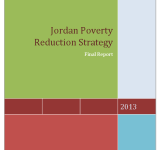vocational training
Jobs are crucial for individual well-being. They provide a livelihood and;; equally important;; a sense of dignity. They are also crucial for collective well-being and economic growth. However;; the rules and the incentives that govern labor markets in MENA countries have led to inefficient and inequitable outcomes on the personal and collective standpoint. Several underlying distortions prevent a more productive use of human capital and have led to a widespread sense of unfairness and exclusion;; of which the Arab Spring was a powerful expression.
تهدف هذه الدراسة إلى تحديد حجم العرض والطلب المتوقع من خدمات التدريب المهني والتعليم التقني في الأردن في وظائف تكنولوجيا الاتصالات والمعلومات للمستويات خلال الأعوام (20113-2015);; إضافة إلى التعرف على دور التدريب المهني والتعليم التقني في تلبية الطلب على العمالة حسب الجنس والمحافظة والتخصص المهني والمستوى في وظائف تكنولوجيا الاتصالات والمعلومات;; وتحديد احتياجات القطاعات الاقتصادية المختلفة من وظائف تكنولوجيا الاتصالات والمعلومات ووضع التوصيات اللازمة واقتراح السياسات والبرامج اللازمة لتطوير القطاع وتمكينة من خلق فرص عمل جديدة للشباب الأردني.
This report explores the role of Small and Medium-Enterprises (SME);; as an agent for sustainable human development in Jordan. It analyzes SMEs and their contribution to human development using fours key central pillars of human development;; namely: economic growth that is equitable and pro-poor;; social progress;; participation and empowerment through micro finance;; and environmental sustainability. The report analyses the link between SMEs and empowerment or lack thereof;; with a specific focus on the two issues of employment;; as a tool for empowerment;; and the capacity of SMEs to enhance the position of women within the workforce and home. The report findings were based on extensive research;; a survey of 1;;500 firms and focus groups discussions conducted across the governorates of Jordan. The report proposed general recommendations in terms of institutional coordination;; exports;; cluster groups;; quality standard;; government monitoring;; tax law;; local development;; youth empowerment and the increase of minimum wage.
The Government of Jordan adopted its first Poverty Alleviation Strategy in 2002 recognizing poverty as a key development problem requiring a comprehensive policy for improving the lives of the poor and socially excluded;; increasing their human capabilities;; providing them with economic opportunities and fully integrating them in the society. Considerable progress in poverty reduction has been achieved. The Government has put in place a series of social programs aimed at increasing employment opportunities;; curbing unemployment;; combating poverty and offering in-kind and cash assistance for the poor and marginalized groups within Jordanian society








